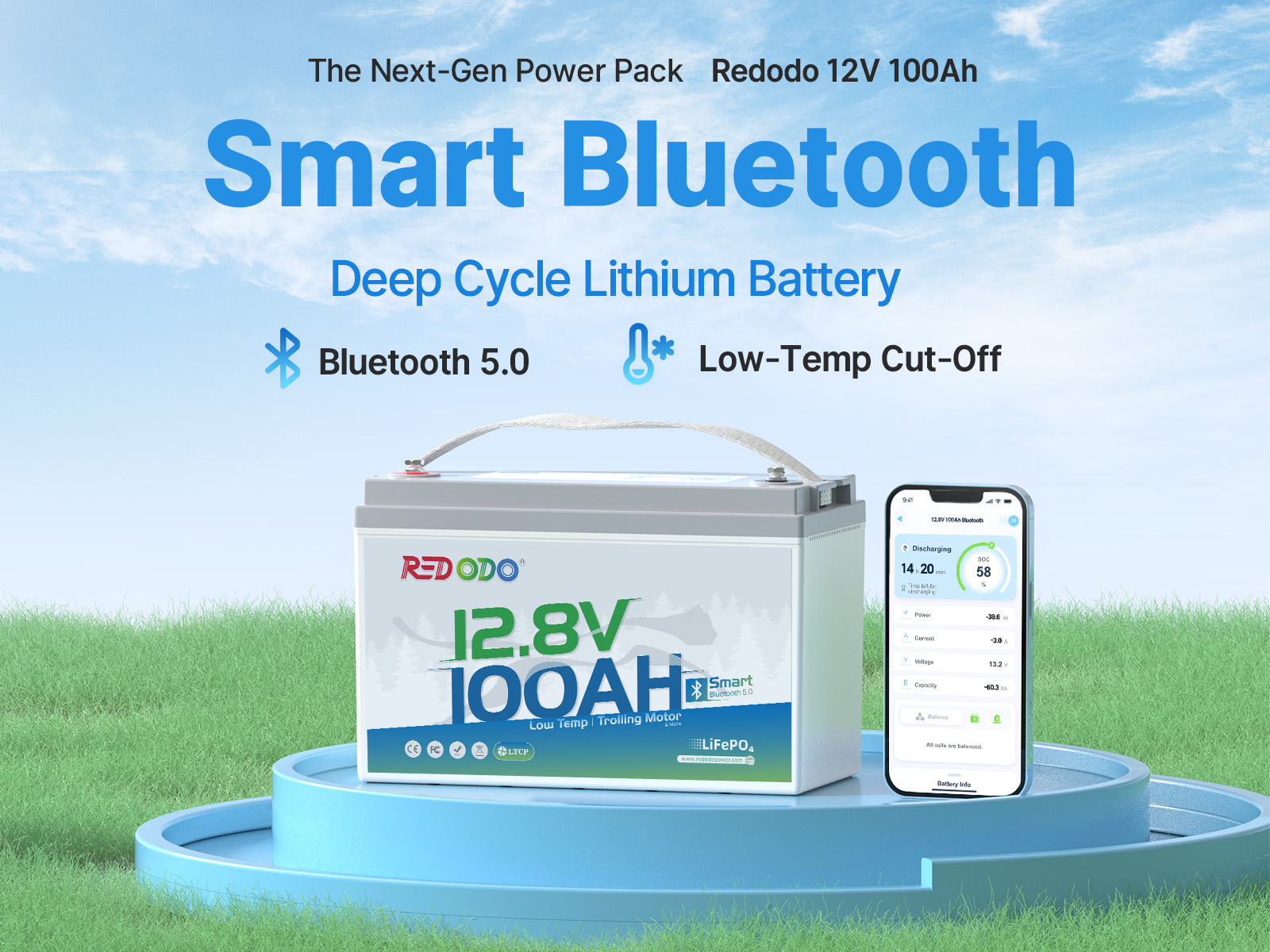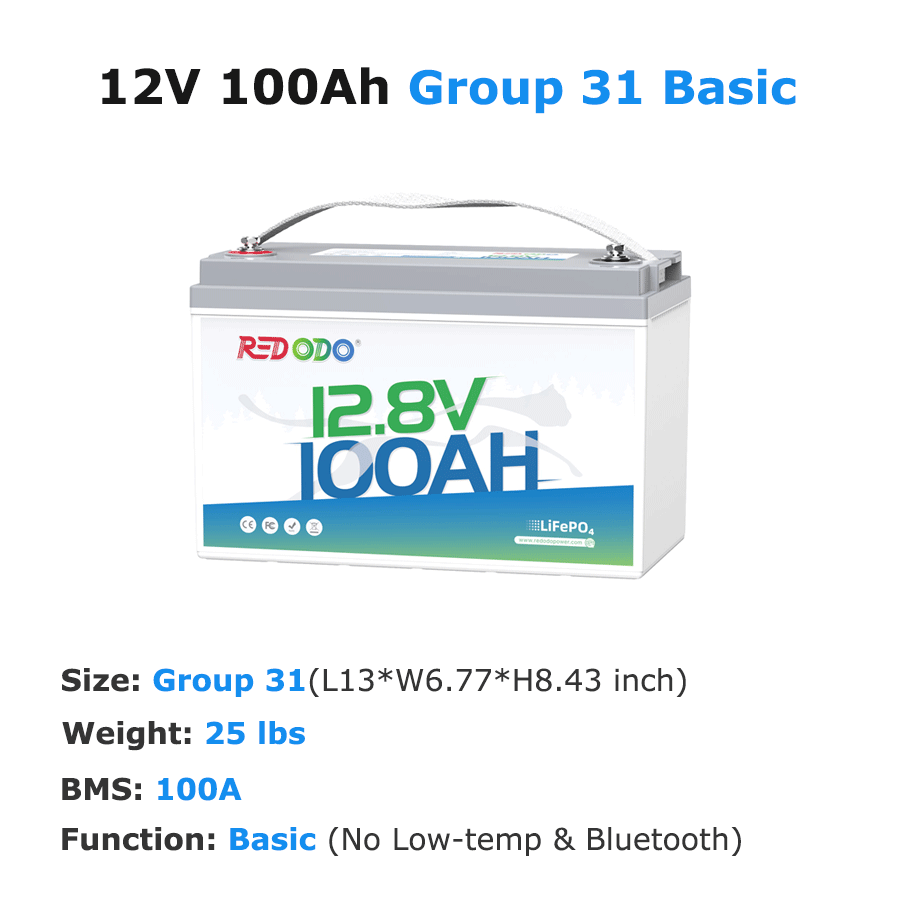12V 100Ah Battery vs 24V 100Ah Battery: Which is Better?
When choosing a battery for your RV, boat, solar power system, or off-grid setup, you may consider the most commonly compared battery options: 12V 100Ah and 24V 100Ah battery. But which one is right for you?
In this article, we’ll explore the key differences between a 12V 100Ah battery and 24V 100Ah battery, explain which might be better for your use case to help you make an informed decision.
Table of Content
Key Point: When to Choose 12V 100Ah vs. 24V 100Ah Battery
Here's a simplified breakdown to help you make a quick decision:
Choose a 12V 100Ah Battery if:
- You need a reliable battery for your RV, small boat, or camping gear.
- Your system is already built around 12V devices.
- You prefer a modular battery you can wire in series or parallel as needed.
Choose a 24V 100Ah Battery if:
- You’re building or upgrading a high-power system.
- You want improved efficiency with thinner cables and less heat.
- Your solar setup or inverter operates at 24V or above.
What Is the Difference: 12V 100Ah vs. 24V 100Ah Battery?
1. Voltage and Power Output
The primary difference between a 12V 100Ah battery and a 24V 100Ah battery lies in their voltage output. Voltage refers to the electrical potential and determines the energy available for a specific current draw.
Take lithium batteries as example:
| Battery Type | Voltage (V) | Capacity (Ah) | Energy (Wh) |
|---|---|---|---|
| 12V 100Ah | 12.8V | 100Ah | 1,280Wh |
| 24V 100Ah | 25.6V | 100Ah | 2,560Wh |
- 12V 100Ah Battery: Offers 1,280 watt-hours (Wh) of energy. It is a lower-voltage system, typically used in RVs, small boats, and as individual units for modular setups.
- 24V 100Ah Battery: Offers 2,560 watt-hours, which is double the energy at the same amp-hour rating, making it more efficient for high-power applications.
Although both batteries deliver 100Ah, the 24V model stores twice as much energy due to the higher voltage.
2. Applicable Scenarios
12V 100Ah Battery:
- Suitable for RV house batteries, 12V trolling motors, portable solar generators, and camping gear.
- Compatible with most 12V solar charge controllers and inverters.
- Easier to find compatible accessories (fuses, chargers, etc.).
24V 100Ah Battery:
- Designed for off-grid solar systems, 24V trolling motor and electric vehicles, large inverter systems, and heavy-duty industrial use.
- Often includes higher amp BMS to handle higher voltage safely.
- Reduces current flow, which helps with cooler and safer operation in high-power applications.
3. Current Draw at Equal Power
For the same power load (e.g, 1200W), a 12V battery will need to deliver more current than a 24V battery:
Using a 12V battery: Current = Power / Voltage = 1200W / 12V = 100A
Using a 24V battery: Current = 1200W / 24V = 50A
For a 24V lithium battery system, the less current helps:
- Reduce heat buildup in wires and components.
- Minimize voltage drop over long cable runs.
- Allow the use of thinner and cheaper wires.
4. Battery Count
In systems that require higher voltages like 48V battery system, using 24V batteries reduces the number of batteries needed in series. To build a 48V system, you’ll need four 12V batteries in series, while 24V battery just need 2 batteries in series.
5. Costs
A 24V 100Ah battery generally costs more upfront than a 12V 100Ah battery, because it includes twice the energy and more internal cells.
- 12V 100Ah battery: ~$200–$400
- 24V 100Ah battery: ~$400–$700
Redodo provides competitively priced 12V and 24V LiFePO4 batteries without compromising on quality, making them a smart and reliable choice for budget-conscious users.
Is a 24V Battery Better Than a 12V Battery?
Both the voltage configurations come with their own advantages and disadvantages, and the best choice depends on your specific energy needs and the system you’re powering.
Advantages of 12V Batteries
- Wider Compatibility: Most RVs, boats, vehicles, and portable electronics are designed to run on 12V power, making this configuration widely supported.
- Easier to Find and Replace: 12V batteries, chargers, and accessories are readily available online and at retail stores.
- Flexible Configuration: You can wire multiple 12V batteries in series to build a 24V or 48V system, or in parallel to increase capacity (Ah).
- Simpler for Beginners: Suitable for users who are beginners, without complex rewiring or system changes.
Explore Redodo 12V 100Ah batteries series, and find the right battery for your needs.
Disadvantages of 12V Batteries
- Higher Current at Same Power: To power a high-power equipment, a 12V battery must deliver higher amps draw, which increases wire size requirements.
- More Batteries Needed for High Voltage Systems: If you need 48V for a solar setup, you’ll need four 12V batteries in series versus two 24V batteries.
- Potential for Efficiency Loss: Higher current can cause more energy loss over long cable runs, especially in large off-grid systems.
Advantages of 24V Batteries
- Improved Efficiency: Delivers the same power with half the current, which reduces energy loss in cables and components.
- Lower Installation Costs for Large Systems: Thinner wiring, smaller fuses, and fewer connectors may reduce overall system cost in high-power setups.
- Space and Weight Savings: Fewer batteries are needed for systems like 48V, which simplifies layout and reduces weight.
Disadvantages of 24V Batteries
- Limited Compatibility: Many consumer-grade electronics, RV appliances, and marine accessories are built for 12V systems, so using 24V may require voltage converters.
- More Expensive Upfront: A 24V 100Ah battery typically costs more than its 12V counterpart, though it offers twice the energy.
- Charger and Inverter Limitations: You’ll need a 24V-compatible battery charger and inverter. Using 12V equipment with a 24V battery could damage your devices.
Comparison Chart of 12V 100Ah vs. 24V 100Ah Battery
| Aspect | 12V 100Ah Battery | 24V 100Ah Battery |
|---|---|---|
| Power Demand | Lower power systems (under 2000W) | Higher power systems (2000W and above) |
| Current Draw | Higher (more heat/wiring requirements) | Lower (more efficient) |
| System Voltage | Best for 12V systems | Best for 24V or 48V systems |
| Ease of Use | Plug-and-play with wide compatibility | May need voltage-specific components |
| Scalability | Flexible (series/parallel) | Efficient scaling with fewer units |
| Upfront Cost | Lower initial investment | Higher cost |
| Applications | RVs, boats, portable setups | Solar, off-grid cabins, EVs, large inverters |
How to Choose the Right Battery for Your Needs: Key Factors
When selecting a 12V or 24V lithium battery, there are several key factors to consider to ensure you’re making the right choice for your setup.
Considerations:
- Power Requirements: Determine how much power you need for your system. Smaller systems, such as those used in small RVs or boats, may only require a 12V battery. Larger systems will benefit from a 24V battery.
- System Compatibility: Check if your existing system is designed for 12V or 24V. If your system is already built around a 12V setup, switching to a 24V battery may require additional components like converters or wiring changes.
- Budget Constraints: 12V batteries are generally more affordable, while 24V batteries have a higher initial cost. However, the latter may offer better efficiency and long-term savings for larger systems.
Recommendations:
- 12V 100Ah Battery: Best for small to medium applications where the energy requirements are low to moderate. These are ideal for smaller setups where space and budget are limited.
- 24V 100Ah Battery: Perfect for larger systems that require higher efficiency and power output. These are best for off-grid solar systems, larger RVs, and commercial setups where more energy is needed.
Conclusion
The debate between 12V 100Ah battery and 24V 100Ah battery comes down to understanding your application, power needs, and system design. Both offer distinct advantages in different scenarios. While 12V batteries provide broad compatibility and flexibility, 24V batteries deliver better performance in high-demand applications with greater efficiency.
Before making your choice, assess your current system, consider future expansion, and check the compatibility of your devices. Whether you're powering a camper van, solar setup, or electric boat, the right voltage system can make a significant difference in performance, safety, and longevity.

Redodo

Redodo
Join Redodo
Related Post

How Much Power Does an RV Consume Per Day? 2026 Guide

What is the Best Battery for Yamaha Golf Carts?

Can You Live on a Houseboat in the US?

Are Deep Cycle Batteries AGM or Lithium? A Complete Guide

.jpg)









